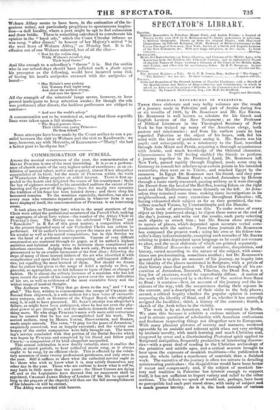COMMEMORATION OF PURCELL.
AMONG the musical occurrences of the year, the commemoration of HENRY Putter-1.e is one of the most interesting. It is so as a perform- ance of church music of the very highest order of excellence; as an ex- hibition of musical talent, native and acquired, almost if not altogether unparalleled of its kind; but the music of PURCELL within the walls of Westminster Abbey acquires an added interest. There it first ap- pealed to the hearts and delighted the senses of his countrymen ; there the boy of eighteen revealed to his astonished auditors the extent of his learning and the power of his genius ; there for nearly two centuries the tradition of his fame has been handed down ; and there sleep his honoured remains. To the musician especially, therefore, but also to every man who venerates departed genius in whatever form it may have displayed itself, the commemoration of PURCELL is an interesting event.
It took place on Thursday last : when to the usual members of the Choir were added the professional members of the Purcell Club, making an aggregate of about forty voices—the number of the Abbey Choir in PURCELL'S time. The Service was the celebrated " Te Deum " and " Benedicite" in B fiat of this great master ; a composition which in the present degraded state of our Cathedral Choirs can seldom be performed. Of its author's inventive power the traces are abundant in his secular as well as his sacred compositions, but in this Service we see the hand of a profound contrapuntist. Canons of very difficult construction are scattered through its pages, as if its author's highest ambition and habitual study were to fabricate these complicated and laborious exercises. Judging from this work only, PURCELL would be pronounced to be an erudite harmonist of the first class ; following the steps of many of those learned fathers of the art who identified it with complication and spent their lives in conquering self-imposed difficul- ties, yet equalling the most learned of them. Nor should we dream that its author had given to the songs of Ariel a melody so free, so graceful, so appropriate, as to bid defiance to lapse of time or change of fashion. He is almost the solitary instance of a musician who has left upon record the proofs of his complete power over the mere difficulties of his art, as well as evidences of the most excursive fancy and the widest range of musical thought. The Anthems were, " They that go down to the sea," and " I was glad."' The first, written to commemorate the escape of CHARLES the Second from shipwreck, is a solo anthem for a bass voice of extraordi- nary compass, such as GOSLING of the Chapel Royal, who originally sung it, is said to have possessed. Mr. SALE'S attempt was altogether a failure, as might have been anticipated, since he has not even the phy- sical power to get through it ; and the anthem demands this and some- thing more. He who sings PURCELL'S notes with mere cold correctness may be assured that he has not accomplished half his work. The second anthem, sung by Messrs. Younn, Baownsstrra, and BAILEY, made ample amends. The verse, " 0 pray for the peace of Jerusalem," exquisitely conceived, was as happily executed ; and the variety and beauty of the entire composition were fully brought out. The morn- ing's service concluded with that portion of the Burial Service which was begun by PURCELL and completed by his friend and fellow pupil CROFT,--a composition of its kind altogether unequalled. This annual celebration is now doubly valuable, since it enables the public, at stated periods, to hear cathedral music sung, as it always ought to be sung, by an efficient choir. This is effected by the volun- tary accession of some twenty professional gentlemen, and only once in the year. Still it suffices to show what the cathedral service ought to be : those who wish to know what it is, may satisfy themselves any other day in the year. Those who are curious to know what it will be, may learn in little more than ten years : the Minor Canons are dying off, and as the Legislature have decreed that no successors shall be appointed, CHARLES JAMES Bishop of London (if his life be spared so long to the prayers of the church) will then see the full accomplishment of his labours—it will be extinct.
The Abbey was crowded with hearers.


























 Previous page
Previous page